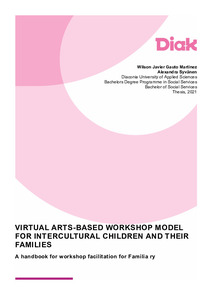VIRTUAL ARTS-BASED WORKSHOP MODEL FOR INTERCULTURAL CHILDREN AND THEIR FAMILIES: A Handbook for workshop facilitation for Familia ry
Gauto Martinez, Wilson Javier; Syvänen, Alexandra (2021)
Gauto Martinez, Wilson Javier
Syvänen, Alexandra
2021
All rights reserved. This publication is copyrighted. You may download, display and print it for Your own personal use. Commercial use is prohibited.
Julkaisun pysyvä osoite on
https://urn.fi/URN:NBN:fi:amk-2021111920740
https://urn.fi/URN:NBN:fi:amk-2021111920740
Tiivistelmä
Familia ry, a nongovernmental organization with headquarters located in Helsinki, Finland, observed a significant disruption to their ability to carry out daily activities and services to their target group, intercultural families residing in Finland, due to the global Covid-19 pandemic. The aim of this product-based thesis responded to this notion directly: to digitize and digitalize an updated and adapted version of an existing arts based workshop model and handbook. The target group for the virtual arts-based workshop model included intercultural children five to seven years of age and their parents. Three parents and four children participated in the thesis workshops.
The model delivers a four part workshop series oriented towards intercultural identity development through arts based methods within an online learning environment. The content of the workshops was implemented in two phases, the first half (the pilot) took place in April 2021 and the second half between May and June 2021. The facilitation of the updated, digitized and digitalized workshops was critical in assuring product quality. Feedback and observational notes complemented the field research previously made. The developed handbook serves as a facilitation guide as includes practical information pertaining to safety and ethics, technicalities, resources, and detailed instructions of each of the four individual workshops in the series. Contents were devised through pedagogical and participatory based approaches and employed through arts based methods.
The art was viewed as the medium, not as the desired product. Meaning, although the participants of the virtual arts based workshops showed great interest and enjoyment towards the contents and activities of the workshops, they also explored notions of diversity, culture, sense of community, multiculturalism, and multilingualism.
The resulting product, which was made available to Familia ry, represents a potential tool for future projects and services provided by them. An aspect of great potential has been the expanded accessibility of their services through the virtual nature of the model. Prospects include increased networks for the target group and work life partner, adaptability of the model to contexts including diverse target groups, topics, and settings. Furthermore, opportunities for collaboration with other organizations are within reach. A special consideration towards language accessibility is recommended.
The model delivers a four part workshop series oriented towards intercultural identity development through arts based methods within an online learning environment. The content of the workshops was implemented in two phases, the first half (the pilot) took place in April 2021 and the second half between May and June 2021. The facilitation of the updated, digitized and digitalized workshops was critical in assuring product quality. Feedback and observational notes complemented the field research previously made. The developed handbook serves as a facilitation guide as includes practical information pertaining to safety and ethics, technicalities, resources, and detailed instructions of each of the four individual workshops in the series. Contents were devised through pedagogical and participatory based approaches and employed through arts based methods.
The art was viewed as the medium, not as the desired product. Meaning, although the participants of the virtual arts based workshops showed great interest and enjoyment towards the contents and activities of the workshops, they also explored notions of diversity, culture, sense of community, multiculturalism, and multilingualism.
The resulting product, which was made available to Familia ry, represents a potential tool for future projects and services provided by them. An aspect of great potential has been the expanded accessibility of their services through the virtual nature of the model. Prospects include increased networks for the target group and work life partner, adaptability of the model to contexts including diverse target groups, topics, and settings. Furthermore, opportunities for collaboration with other organizations are within reach. A special consideration towards language accessibility is recommended.
